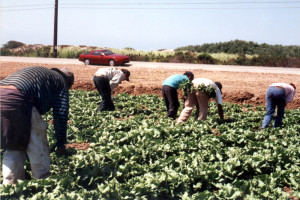 Despite the perception pesticides are necessary to ensure sufficient production of agricultural goods, there can be enormous costs associated with their use on farm workers and the environment that must be prevented.
Despite the perception pesticides are necessary to ensure sufficient production of agricultural goods, there can be enormous costs associated with their use on farm workers and the environment that must be prevented.
In California, the use of pesticides seems to form the backbone of our current agricultural system.
According to the California Department of Pesticide Regulation (CDPR), in 2010, 173,213,823 lbs. of pesticides were applied on crops throughout the state, an increase of about 15 million lbs. from the previous year.
The abundant use of pesticides can negatively impact the environment.
The Pesticide Action Network (PAN) links the decrease in honeybee and bat populations to the use of pesticides. The group also worries other wildlife may be negatively impacted by the contamination of groundwater and runoff into waterways.
Yet, more than the environment is at stake.
PAN has also claimed certain pesticides are correlated to Attention Deficit Hyperactivity Disorder (ADHD) and autism, while others have been linked to birth related defects and cancer.
The majority of these health concerns impact the people closest to the agricultural sector: the farm workers.
According to Maria Machuca, Communications Director of the United Farm Workers (UFW), there are approximately 400,000 farm workers in California, of which about 99 percent are of Hispanic descent.
These are the people behind the production of our food, who have suffered when insufficient precautions have been taken to keep dinner tables full.
The UFW is currently fighting the use of one harmful pesticide, methyl iodide, on the behalf of its members, as one of the plaintiffs in an Alameda Country Superior Court case against the CDPR’s current position on the compound.
The UFW claims, “Methyl iodide is a known carcinogen that could cause spontaneous miscarriages and contaminate groundwater. Injecting it as a gas into the soil presents unacceptable risks to farm workers, nearby rural communities, pregnant women and children. Clearly, this toxic chemical is dangerous and should be banned.”
While the CDPR agrees the compound is extremely dangerous and has listed it as a “toxic air contaminant,” the agency believes methyl iodide can be safely regulated.
The Assistant Director of Communications for CDPR Lea Brooks stated, “[C]DPR did not accept U.S. EPA’s (Environmental Protection Agency) label restrictions because they were not restrictive enough to protect the public, farm workers and the environment from adverse environmental effects in California. [C]DPR required the manufacturer, Arysta, to develop a California-only label for methyl iodide that has more health-protective restrictions than U.S. EPA. For example, [C]DPR requires larger buffer zones, more ground water protections, reduced application rates and acreage and stronger protections for workers.”
According to Brooks, methyl iodide has only been applied to six locations in California all of which occurred in 2011 over 15 acres of land.
Those locations were in Fresno, Santa Barbara, San Joaquin and Tulare counties, which ranked first, 12th, fourth and third, respectively, among all other California counties in the amount of pesticides applied per pound in 2010.
Stringent controls are exactly what should be expected from a government agency considering the use of a highly toxic compound.
Brooks commented further, “[C]DPR is defending its determination that methyl iodide can be used with no significant adverse effects if applied under California’s toughest-in-the-nation health-protective restrictions.”
However, in 2007 a number of academics, including Nobel laureates, wrote a letter to the EPA condemning the use of methyl iodide on the grounds of its negative health impacts.
The letter states, “As members of the scientific community, we urge you to do whatever is possible to prevent this chemical from ever becoming a registered pesticide.”
It is clear through their disregard for this warning and use of stricter controls, the CDPR believes it can effectively regulate such a dangerous pesticide.
It remains to be seen whether the CDPR has made the right decision, but when it comes to human lives we must err on the side of caution.
Until all doubt has been removed surrounding the use of methyl iodide, the pesticide should not be available for any use where it could potentially do harm to the people we depend on. Even if the precautions taken are exemplary, it’s not justified to keep our stomachs full.
Marginal benefits in any sector of the economy should never come at the risk of human life, and we must do our best to ensure that the harmful pesticides are avoided at all costs.











